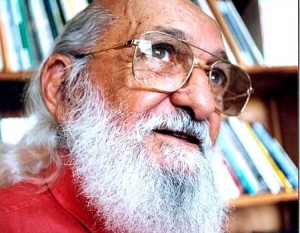 Paulo Freire was a Brazilian educationalist and philosopher whose radical ideas about pedagogy, learning and knowledge led to the establishment of the critical pedagogy movement. Freire held extremely negative views of mainstream approaches to education, using the metaphor of the “banking” system to describe them. Freire argued that mainstream education, as it is predominantly practiced, revolves around teachers’ attempts to deposit knowledge ‘into’ students, who are understood to be passive, empty “accounts”.
Paulo Freire was a Brazilian educationalist and philosopher whose radical ideas about pedagogy, learning and knowledge led to the establishment of the critical pedagogy movement. Freire held extremely negative views of mainstream approaches to education, using the metaphor of the “banking” system to describe them. Freire argued that mainstream education, as it is predominantly practiced, revolves around teachers’ attempts to deposit knowledge ‘into’ students, who are understood to be passive, empty “accounts”.
As an alternative educational approach, Freire proposed that oppressed peoples need to become critically conscious, which is, in his view, the first step towards liberation and social change. According to Freire, becoming aware of the conditions of one’s oppression conscientises oppressed peoples and, in turn, catalyses transformative actions. This may lead to people altering oppressive structural conditions. Critical pedagogy is not a method, rather it opens a space for students to act and assert themselves as agents, question their assumptions, develop an appreciation for history and critically interrogate the idea that education is a value-neutral enterprise.
Essential reading:
Freire, P. (1970). Pedagogy of the Oppressed. New York, Continuum.
Further reading
Freire, P. (1973). Education for critical consciousness. New York, Seabury Press.
Faundez, Antonion, and Paulo Freire (1992). Learning to Question: A Pedagogy of Liberation. Trans. Tony Coates, New York, Continuum.
Freire, P. and D.P. Macedo (1987). Literacy: reading the word & the world. South Hadley, Mass., Bergin & Garvey Publishers.
Freire, P. and H. Giroux & P. McLaren (1988). Teachers as intellectuals: towards a critical pedagogy of learning
Questions:
How did Freire believe education could contribute to social change?
What is the relationship between the oppressed and the oppressor in Freire’s view?
What is knowledge according to Paulo Freire?
What did Freire believe was the relationship between reflection and action?
Submitted by Adam Cooper